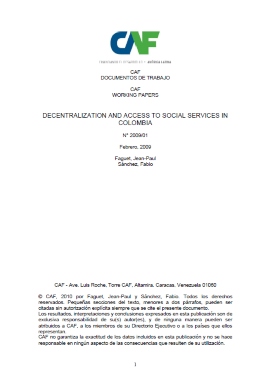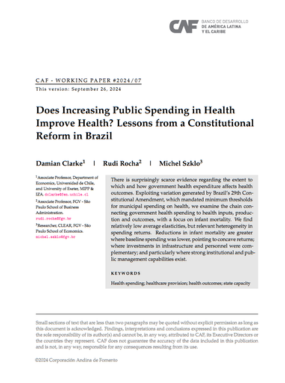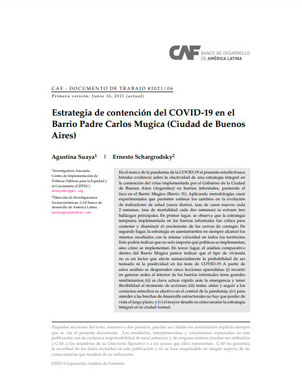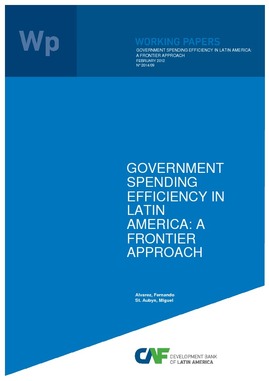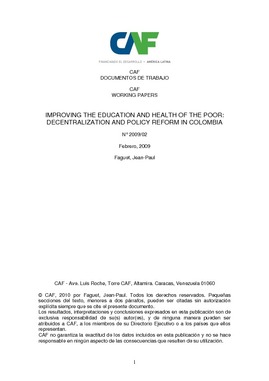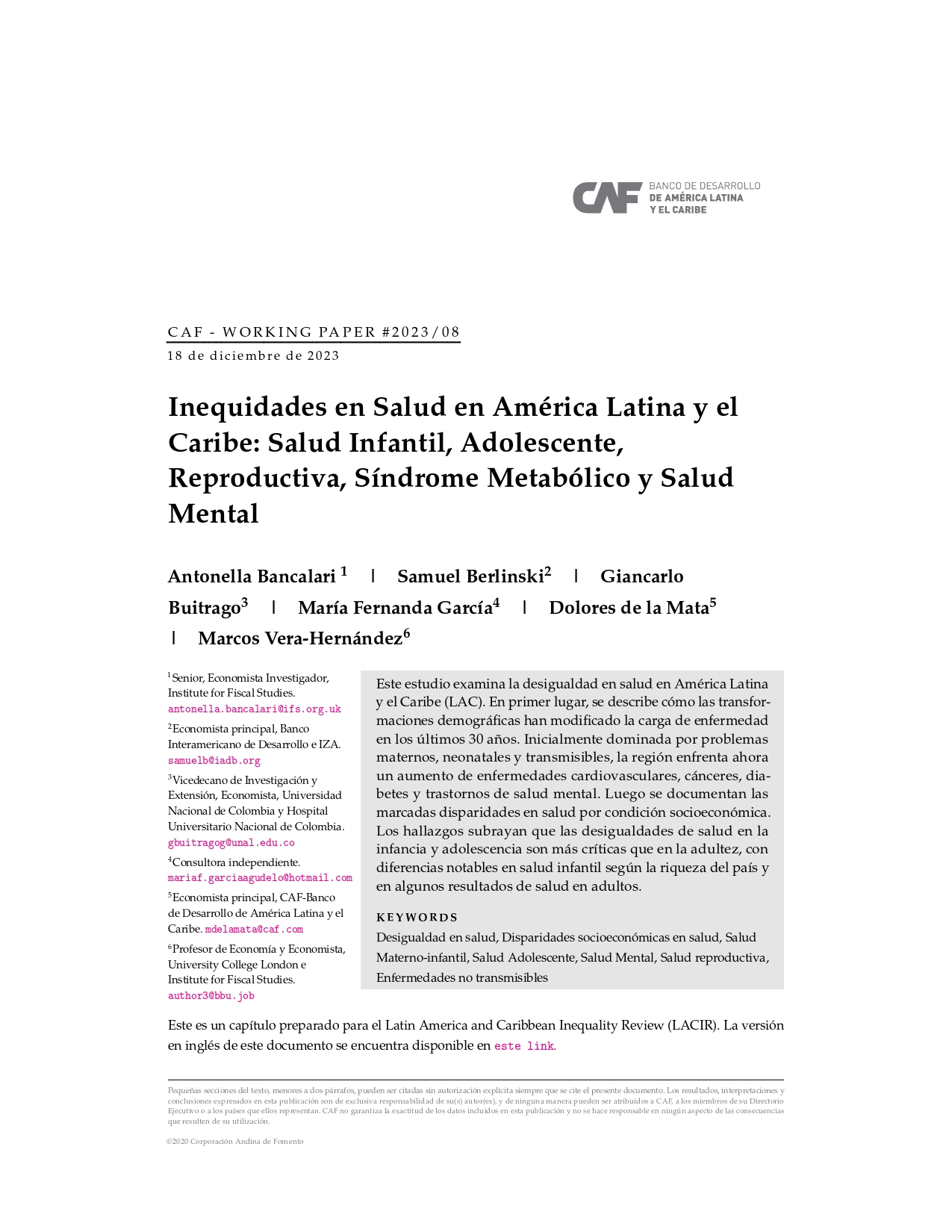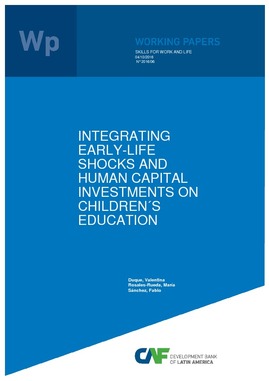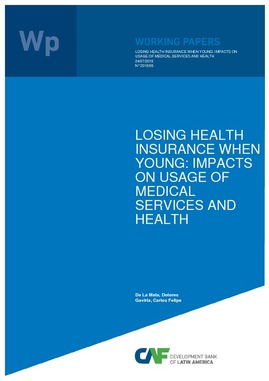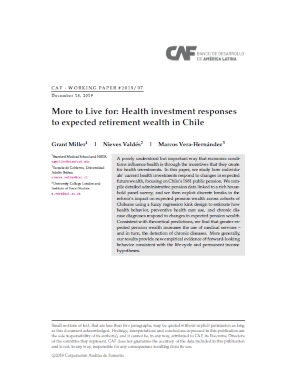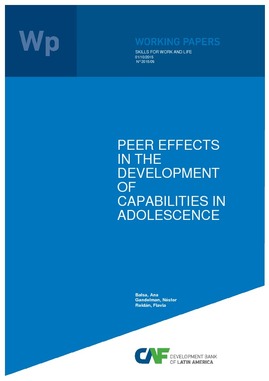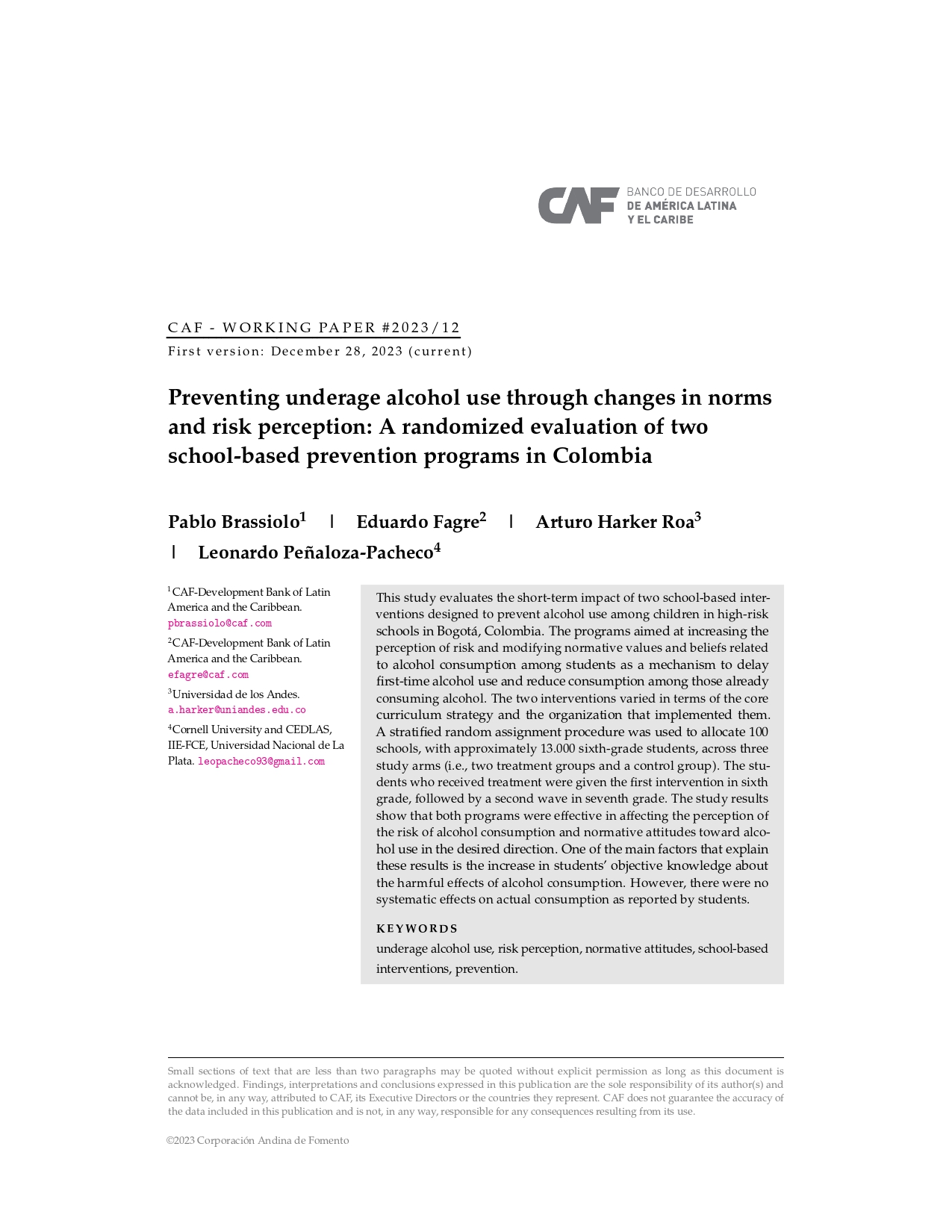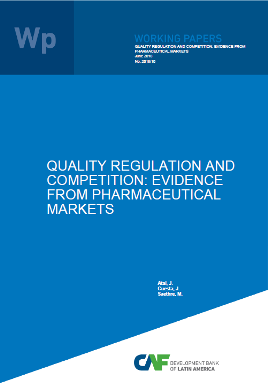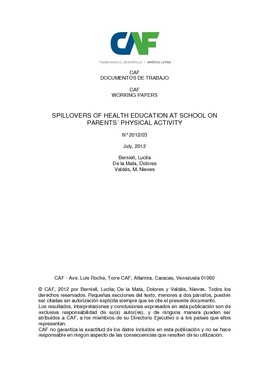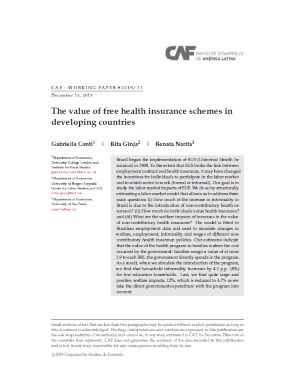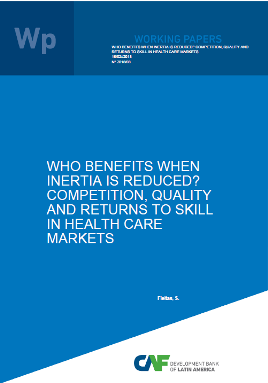Listar6.1 Documentos de trabajo en investigación socioeconómica por tema "Salud"
Mostrando ítems 1-17 de 17
-
Decentralization and Access to Social Services in Colombia
(CAF; Caracas, 2009)A central claim in favor of decentralization is that it will improve access to public services, but few studies examine this question empirically. This paper explores the effects of decentralization to access to health and ... -
Does Increasing Public Spending in Health Improve Health? Lessons from a Constitutional Reform in Brazil
(2024-09-26)There is surprisingly scarce evidence regarding the extent to which and how government health expenditure affects health outcomes. Exploiting variation generated by Brazil’s 29th Constitutional Amendment, which mandated ... -
Estrategia de contención del COVID-19 en el Barrio Padre Carlos Mugica (Ciudad de Buenos Aires)
(CAF; Caracas, 2021-06-16)En el marco de la pandemia de la COVID-19 el presente estudio busca brindar evidencia sobre la efectividad de una estrategia integral en la contención del virus implementada por el Gobierno de la Ciudad de Buenos Aires ... -
Government Spending Efficiency in Latin America: A Frontier Approach
(CAF, 2014-09)Government spending efficiency in providing education and health is evaluated across countries of the world, with a special emphasis on Latin American countries. Using stochastic frontier and data envelopment analysis, it ... -
Improving the education and health of the poor: decentralization and policy reform in Colombia
(CAF; Caracas, 2009)A central claim in favor of decentralization is that it will improve access to public services, but few studies examine this question empirically. This paper, the policyoriented companion to Faguet and Sánchez (2009), ... -
Inequidades en Salud en América Latina y el Caribe: Salud Infantil, Adolescente, Reproductiva, Síndrome Metabólico y Salud Mental
(CAF- banco de desarrollo de América Latina y el Caribe, 2023-12-19)Este estudio examina la desigualdad en salud en América Latina y el Caribe (LAC). En primer lugar, se describe cómo las transformaciones demográficas han modificado la carga de enfermedad en los últimos 30 años. Inicialmente ... -
Integrating Early-life Shocks and Human Capital Investments on Children´s Education
(CAF; Colombia, 2016-10-04)This study investigates how early-life conditions interact with subsequent human capital investments to influence future educational outcomes. To provide causal evidence, we exploit two sources of exogenous variation: i) ... -
Life expectancy at retirement and income levels in Chile
(CAF; Caracas, 2020-06-15)We document that life expectancies at the age of retirement differ significantly by income levels and gender in Chile. Using a sample of over 500 thousand workers that retired under the annuity system, we find that, ... -
Losing health insurance when young: Impacts on usage of medical services and health
(CAF, 2015-04)In this study we exploit a regulation in Colombia that exogenously changes health insurance coverage of young adult dependents, specifically those turning 18 years old, to analyze the effects of losing health insurance ... -
More to Live for: Health Investment Responses to Expected Retirement Wealth in Chile
(CAF; Caracas, 2019-12-18)A poorly understood but important way that economic conditions influence health is through the incentives that they create for health investments. In this paper, we study how individuals’ current health investments respond ... -
Peer Effects in the Development of Capabilities in Adolescence
(CAF; Caracas, 2015-09-29)We estimate peer effects in cognitive, non-cognitive and health-related outcomes in a sample of Uruguayan high-school students. Our identification strategy is based on two features of the data: (i) parents are not able to ... -
Preventing underage alcohol use through changes in norms and risk perception: A randomized evaluation of two school-based prevention programs in Colombia
(Distrito Capital, 2023-12-28)This study evaluates the short-term impact of two school-based inter ventions designed to prevent alcohol use among children in high-risk schools in Bogotá, Colombia. The programs aimed at increasing the perception of risk ... -
Quality Regulation and Competition: Evidence from Pharmaceutical Markets
(CAF; Caracas, 2018-06)We study the equilibrium effects of quality regulation on market outcomes by exploiting the staggered phase-in of bioequivalence requirements for generic drugs in Chile. While the objective of the regulation was to increase ... -
Sistemas de salud e Inequidades en Salud en América Latina
(2023-12-20)El presente documento describe medidas de desigualdad en el acceso a la atención sanitaria y en los resultados de salud en países de América Latina, utilizando métricas estandarizadas introducidas en un estudio relacionado ... -
Spillovers of health education at school on parents´ physical activity
(CAF; Caracas, 2012)To prevent modern health conditions like obesity, cancer, cardiovascular illness, and diabetes, which have reached epidemic-like proportions in recent decades, many health experts argue that students should receive Health ... -
The Value of Free Health Insurance Schemes in Developing Countries
(CAF; Caracas, 2019-12-13)Brazil began the implementation of SUS (Universal Health Insurance) in 1988. To the extent that SUS broke the link between employment contract and health insurance, it may have changed the incentives for individuals to ... -
Who benefits when inertia is reduced? Competition, quality and returns to skill in health care markets
(CAF; Caracas, 2018)Increased competition may lead to incentives for firms to increase quality by incorporating higher quality inputs. This is particularly relevant in health care markets, since the supply of high quality physicians is ...


